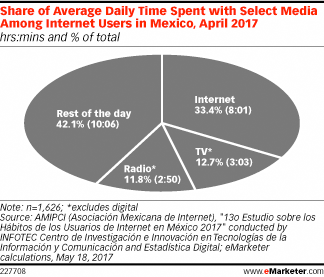New Rules in Mexico Unlock FM Radio on Smartphones
June 9, 2017
![]() Mexico has a well-documented love affair with radio. There are more than 1,300 FM radio stations in the country, and internet users spend an average of 2 hours 50 minutes listening to radio each day, according to April 2017 data from AMIPCI (Asociación Mexicana de Internet). Yet very few do so on their smartphones.
Mexico has a well-documented love affair with radio. There are more than 1,300 FM radio stations in the country, and internet users spend an average of 2 hours 50 minutes listening to radio each day, according to April 2017 data from AMIPCI (Asociación Mexicana de Internet). Yet very few do so on their smartphones.

That’s all about to change.
In late April, Mexico’s Federal Telecommunications Institute approved a new rule that requires all smartphone manufacturers to enable the technology that allows the device to pick up FM radio signals.
The move came after months of pressure from the National Chamber of Radio and Television Industry (CIRT), and makes Mexico the first country in the world to enact such legislation.
CIRT noted that most smartphones are already designed with a built-in FM radio receiver. Yet in order for smartphone users to get radio signals on their devices, the receivers must be activated by manufacturers.
During its lobbying effort, CIRT noted that in cases of emergencies or natural disasters, mobile networks may stop working altogether. Under these circumstances, FM-enabled smartphones would allow government agencies to send out alerts to citizens.
The effort to enable smartphones’ FM radio capabilities could spread beyond Mexico’s borders.
This past February, US Federal Communications Commission (FCC) Chairman Ajit Pai made a strong argument in favor of FM radio on smartphones.
“It seems odd that every day we hear about a new smartphone app that lets you do something innovative, yet these modern-day mobile miracles don’t enable a key function offered by a 1982 Sony Walkman,” Pai said.
However, Pai also believes the FCC should leave the matter up to the market, rather than forcing the hand of smartphone manufactures.
In a statement to Mexico City-based newspaper La Jornada, CIRT described the new law as an important step in the regulatory framework to benefit radio listeners. CIRT also described radio as a public service essential to keeping Mexicans informed.
Currently, there are very few FM-enabled smartphones on the market. Brands including Motorola, HTC and LG recently added this capability to their devices, but the feature appears to be rare among Samsung smartphones.
The law will also make selling iPhones in Mexico more complicated, since Apple’s iOS was never designed to offer the option to listen to FM radio.
eMarketer estimates there will be 59.8 million smartphone users in Mexico this year. The new rule will give these users free radio access directly from their smartphones, but some analysts fear it will also create a new form of competition and lead to revenue loss for mobile operators, many of whom profit from users streaming data.
On the other hand, the rule is very good news for advertisers, noted Gabriel Richaud, director general of the Interactive Advertising Bureau México (IAB México), since the changes will allow them to leverage the value of broadcasting—local relevancy and audience loyalty—with the rest of their paid and owned media efforts.
“Brands will be able to explore the combination of linear audio with the interaction of digital platforms, which can lead to a richer dynamic between content generators, advertisers and the audience,” Richaud said.
eMarketer expects that just $289.3 million will be allocated to radio ad spending in Mexico this year. Even so, “the passing of this law should help the radio industry keep its share of the advertising market and relevance within Mexican society,” said eMarketer forecasting analyst Andrea Szasz.






























